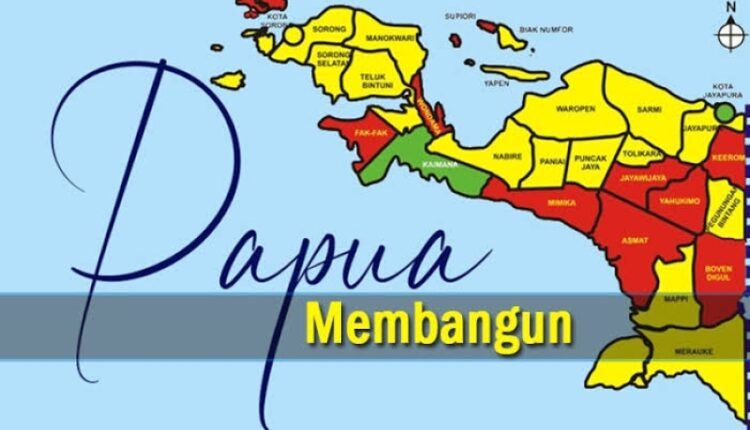By : Manuel Bonay )*
The expansion of the Papua region into several provinces is a central government policy in order to accelerate development in the Land of Papua. Papua Province, which is the easternmost region of the Unitary State of the Republic of Indonesia (NKRI), has an area of 418,707.7 square kilometers, or about three and a half times the size of the island of Java. The expansion of new regions is considered very necessary to improve services and development for Papuan people.
On July 25 2022, three laws (UU) were passed regarding the formation of a new province in Papua, namely Law Number 14 of 2022 concerning the Establishment of South Papua Province, Law Number 15 of 2022 concerning the Establishment of Central Papua Province, and Law Number 16 2022 concerning the Establishment of the Papua Mountain Province.
With the passing of the law establishing a new province, Papua currently consists of six provinces, namely Papua Province with the capital city of Jayapura, West Papua Province with the capital city of Manokwari, South Papua Province with the capital city of Merauke, Central Papua Province with the capital city of Nabire, Papua Province Mountains with the capital Jayawijaya and Southwest Papua Province with the capital Sorong.
The process of expanding the Papua Province region is not only to reduce the scope of government services, but by expanding the region it is hoped that it will be able to improve the economic standard of living of local Papuan residents.
President Joko Widodo said that regional expansion in Papua was an effort to create equitable development. Apart from that, with the existence of the new autonomous region, it is hoped that it will facilitate the reach of services in the vast land of Papua. Apart from that, regional expansion in Papua is an aspiration that comes from the Papuan people themselves. This aspiration has existed for several years and comes from various community groups in various regions.
The demands of various community aspirations for the expansion of a new autonomous region in the Land of Papua were loudly voiced by indigenous community groups after the reform of May 21 1998. However, the expansion of the Papua Province region was responded to dynamically. Papua continues to try to catch up in all development programs. Along with the change in government leadership, the community’s aspirations for regional expansion remain strong, especially during the leadership of President Joko Widodo who is committed to the welfare of indigenous Papuans in various villages and districts.
During the 20 years that Special Autonomy for Papua volume one has been running from 2001 to 2022, there has been a lot of progress and development success experienced by the people of the Land of Papua, including the construction of various airports, ports, roads, bridges, electricity, healthy housing, clean water infrastructure and even remote areas. villages and districts.
The success of volume one of the Papua Special Autonomy policy was then further refined through Law No. 2 of 2021 concerning the Second Amendment to Law Number 21 of 2001 concerning Special Autonomy for the Province of Papua. With Law No. 2 of 2021, this is a breath of fresh air for the regional government and the Papuan people who still want aspirations for the expansion of the Papua province, because the central government can answer it directly and does not need to get approval from the Papuan People’s Assembly (MRP). With the authority in Law Number 2 of 2021, the process of expanding the Papua Province region has been realized by the central government together with the DPR RI, and has ratified the new autonomous region of Papua.
Meanwhile, Chairman of the Indonesian National Youth Committee (KNPI) Biak Numfor Regency, Papua, Jemmy C. Krobo, said that the creation of new autonomous regions in Papua and West Papua Provinces aims to shorten the span of control of government bureaucratic services to the community. Another aim, with the expansion of new autonomous regions in Papua Province, according to Krobo, is to improve the welfare of indigenous Papuan communities in various villages and districts.
Apart from that, with the expansion of the Papua Province region, we can realize the acceleration of development in the Land of Papua. We hope that the expansion of the new autonomous region in Papua can answer the aspirations of all people in Papua. So the presence of a new province in Papua is the hope of the indigenous Papuan community so that they can live a more prosperous, just and independent life.
The expansion of a new autonomous region for Papua Province can be a great hope for all people to live a better and more prosperous life. It is hoped that with the expansion of regions in the Land of Papua, indigenous communities will open up opportunities for ASN native Papuans to fill certain position formations. So that the expansion of the new autonomous region of Papua province can create equal distribution of district/city development programs in the Land of Papua.
Apart from that, an academic from Biak, Dr Muslim Lobubun MH, said that the expansion of the new autonomous region of Papua could accelerate equitable development that better touches the needs of the Papuan people. The economic impact of the expansion of the new autonomous region of Papua Province, includes an increase in the acceleration of the regional economy, the real sector and small and medium businesses in the region are more vibrant. In fact, regional expansion can also absorb university graduates to serve in bureaucratic environments. Apart from that, the government’s efforts to improve the welfare of the indigenous Papuan people by realizing the expansion of new autonomous regions in Papua and West Papua are the government’s strategic policy to build a prosperous Land of Papua within the framework of the Republic of Indonesia.
)* The author is a Papuan student living in Yogyakarta
